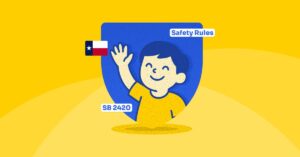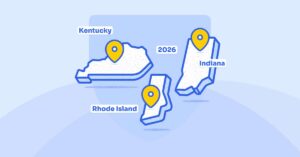Introduction
The Children’s Online Privacy Protection Act (COPPA) is a federal law enacted in the United States in 1998. It regulates the collection of personal information from children under 13 years of age by online services, including various websites and online services, apps, and other forms of online media that collect information. The purpose of COPPA is to protect children’s privacy and give parents control over the information collected from their children online.
Purpose of COPPA
The primary purpose of COPPA is to protect the privacy of children who use the internet and other online services. It requires website operators and app developers to obtain verifiable parental consent before collecting personal information from children under 13. This includes not only names and addresses but also information such as email addresses, phone numbers, and location data. COPPA also requires that websites and apps provide direct notice to parents about their information practices, including what information is being collected, how it will be used, and with whom it will be shared.
History of COPPA
COPPA was enacted in 1998 in response to concerns about the growing amount of personal information collected from children online, including names, addresses, and other sensitive information. At the time, few regulations were in place to protect the privacy of children online, and many parents were concerned about the risks posed by internet companies to their children’s privacy and safety.
Overview of the Implications of COPPA for online businesses
The implications of COPPA for online businesses are significant. Website or online service and app operators must comply with the requirements of COPPA, including obtaining verifiable parental consent, providing notice to parents, and taking steps to protect the security and confidentiality of children’s personal information. Failure to comply with COPPA can result in significant civil penalties and damage to a company’s reputation. For these reasons, it is crucial for all websites or online service businesses to understand COPPA and take steps to comply with its requirements.

Key provisions of COPPA
COPPA contains several key provisions designed to protect the privacy of children’s data while online. These include the requirement for website operators and app developers to obtain verifiable parental consent before collecting personal information from children, the requirement for operators of commercial websites to provide direct notice to parents about their information practices, and the requirement for operators to take reasonable steps to protect the security and confidentiality of children’s personal information.
Enforcing agencies and penalties for non-compliance
COPPA is enforced by the Federal Trade Commission (FTC), which can impose civil penalties on companies that violate the law. The FTC can also require companies to take corrective actions, such as deleting children’s personal information and implementing better privacy practices. Companies that violate COPPA can be fined up to $42,530 per violation, and the FTC has the authority to pursue penalties against both the company and its executives. These penalties can add up quickly and result in significant financial losses for companies that violate COPPA.
Implications of COPPA for online businesses
Website and app operators must obtain verifiable parental consent for collecting personal information from children under 13.
Under COPPA, website operators and app developers are required to obtain verifiable parental consent before collecting personal information from children under 13. This includes information such as a child’s name, address, email address, or other online contact information. Verifiable parental consent can be obtained through a number of methods, including written consent, email consent, or the use of a consent form that requires a parent to provide identifying information.
Operators must provide notice of their privacy policies and practices.
Website operators and app developers must also provide direct notice to parents about their information practices, including what personal information they collect, how they use it, and with whom they share it. This notice must be provided in a clear and prominent manner, and it must be easily accessible to parents.
Operators must take steps to protect the confidentiality, security, and integrity of personal information collected from children.
In addition to obtaining verifiable parental consent and providing direct notice, COPPA requires website operators and app developers to take reasonable steps to protect the confidentiality, security, and integrity of personal information collected from children. This includes implementing appropriate security measures, such as encryption and secure servers, and regularly reviewing and updating these measures to ensure that children’s personal information is always protected.
Operators must delete personal information collected from children when no longer needed for the purpose for which it was collected.
COPPA also requires website operators and app developers to delete personal information collected from children when it is no longer needed for the purpose for which it was collected. This helps minimize the amount of sensitive personal information stored on websites and apps and reduces the risk of unauthorized access to that information.
In summary, COPPA has significant implications for online businesses, and it is vital for companies to be aware of these requirements and to take the necessary steps to comply with the law. Failure to comply with COPPA can result in significant financial penalties and harm to a company or online service’s reputation. It is important for companies and online services to prioritize the privacy and safety of children online.

Best Practices for COPPA Compliance
Assess the age of users and the target audience of your website or app.
The first step in complying with COPPA is to assess the age of your website or app’s users and the target audience. If your website or app is directed to children under 13 or if you have actual knowledge that you are collecting personal information from children under 13, then you are subject to COPPA’s requirements.
Develop and implement a privacy policy that complies with COPPA requirements.
Once you have determined that your website or app is subject to COPPA, developing and implementing a privacy policy that complies with COPPA’s requirements is important. Your privacy policy should clearly explain what personal information you collect from children, how you use it, and with whom you share it. It should also describe the steps you take to protect children’s personal information’s confidentiality, security, and integrity.
Obtain verifiable parental consent before collecting personal information from children.
In order to collect personal information from children under 13, you must obtain verifiable parental consent. Verifiable parental consent can be obtained through a number of methods, including written consent, email consent, or the use of a consent form that requires a parent to provide identifying information. When obtaining parental consent, it is important to make sure that the process is secure and that you are able to verify the identity of the parent providing consent.
Limit the amount and type of personal information collected from children.
In order to protect the privacy of children, it is best practice to limit the amount and type of personal information you collect from children. This includes avoiding the collection of sensitive information, such as a child’s social security number, and limiting the use of personal information to the purpose for which it was collected.
Provide annual training to employees on COPPA compliance.
Finally, it is important to provide annual training to employees on COPPA compliance to ensure that everyone involved in collecting, using, and storing personal information from children is aware of COPPA’s requirements and the steps that must be taken to comply with the law. This training should cover the key provisions of COPPA, best practices for obtaining verifiable parental consent, and the steps that must be taken to protect the confidentiality, security, and integrity of children’s personal information.
Complying with COPPA is critical for online businesses that collect personal information from children under 13. It is essential to regularly review and update your COPPA compliance measures to ensure that they are up-to-date and effective in protecting children’s privacy.
Conclusion
Summary of key points of COPPA
This article discusses COPPA (Children’s Online Privacy Protection Act), and its implications for online businesses to protect children. COPPA is a federal law enacted in 1998 to protect the privacy of children under the age of 13 when they use online services. The law requires website and app operators to obtain verifiable parental consent before collecting personal information from children and to take steps to protect that information’s confidentiality, security, and integrity.
Emphasis on the importance of COPPA compliance and avoiding penalties for non-compliance
COPPA compliance is crucial for online businesses to protect the privacy of children and to avoid penalties for non-compliance. The Federal Trade Commission (FTC) enforces COPPA regulations and can impose civil penalties for violations. To ensure COPPA compliance, online businesses should assess the age of their users and target audience, develop and implement a privacy policy that complies with COPPA requirements, obtain verifiable parental consent before collecting personal information from children, limit the amount and type of information collected, and provide annual training to employees on COPPA compliance.
Overall, COPPA is an important law that helps ensure and protect children’s safety and privacy online. By following best practices for COPPA compliance, online businesses can protect children’s privacy and avoid penalties for non-compliance and maintain their reputation as responsible and trustworthy companies.




